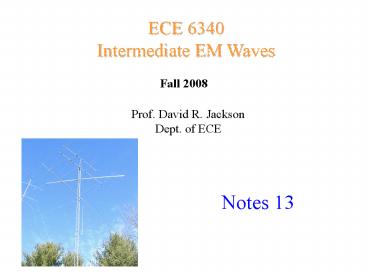ECE 1100 Introduction to Electrical and Computer Engineering - PowerPoint PPT Presentation
1 / 11
Title:
ECE 1100 Introduction to Electrical and Computer Engineering
Description:
Two TMz modes (or TEz modes) are orthogonal to each other if they are not degenerate: ... Consider two non-degenerate modes that are either both TEz or both TMz. ... – PowerPoint PPT presentation
Number of Views:87
Avg rating:3.0/5.0
Title: ECE 1100 Introduction to Electrical and Computer Engineering
1
ECE 6340 Intermediate EM Waves
Fall 2008
Prof. David R. Jackson Dept. of ECE
Notes 13
2
Mode Orthogonality
Mode m (Em, Hm)
Mode n (En, Hn)
Modes are orthogonal (in the complex power
sense) if
3
Mode Orthogonality (cont.)
Assume two modes are orthogonal, and examine the
complex power flowing down the guide when two
modes are present
4
Mode Orthogonality (cont.)
Hence
If two modes are orthogonal, the total complex
power is the sum of the two complex powers of the
individual modes.
5
Lossless Waveguides
Theorem 1 (Lossless WG)
A TEz mode is always orthogonal to a TMz mode.
Theorem 2 (Lossless WG)
Two TMz modes (or TEz modes) are orthogonal to
each other if they are not degenerate
Note If the two modes are degenerate, but they
are linearly independent, we can always choose a
combination of them that will correspond to two
orthogonal modes.
6
Lossless Waveguides Example
Circular waveguide TE11 mode
not orthogonal
orthogonal
7
Lossy Waveguides
The previous two theorems hold for a lossy
waveguide if we change the definition of
orthogonality to be
(Note that there is no conjugate here.)
However, in this case, we can no longer say that
the total power flowing down the waveguide is the
sum of the individual mode powers.
8
Orthogonality for Longitudinal Fields
Consider two non-degenerate modes that are either
both TMz or both TEz. Then we have that
TMz
TEz
Note If the two modes are degenerate, but they
are linearly independent, we can always choose a
combination of them that will correspond to two
orthogonal modes.
9
Orthogonality for Transverse Fields
Consider two non-degenerate modes that are either
both TEz or both TMz. Then we have that for
either case,
Note If the two modes are degenerate, but they
are linearly independent, we can always choose a
combination of them that will correspond to two
orthogonal modes.
10
Orthogonality for Transverse Fields (cont.)
Consider one mode that is TEz and one mode that
is TMz. Then we have that
This is true whether the modes are degenerate or
not.
11
Reference
To see a derivation of the orthogonality
relations, please see the following reference
R. E. Collin, Field Theory of Guided Waves, IEEE
Press, 1991.































